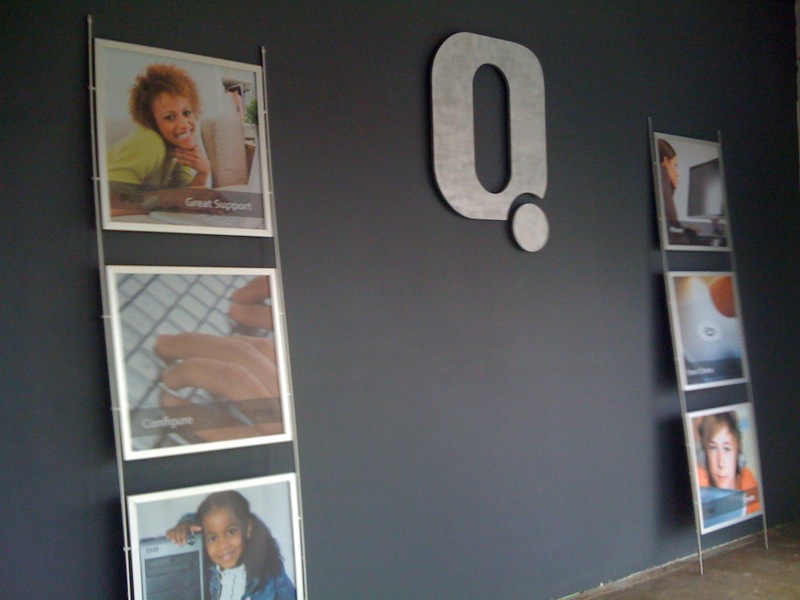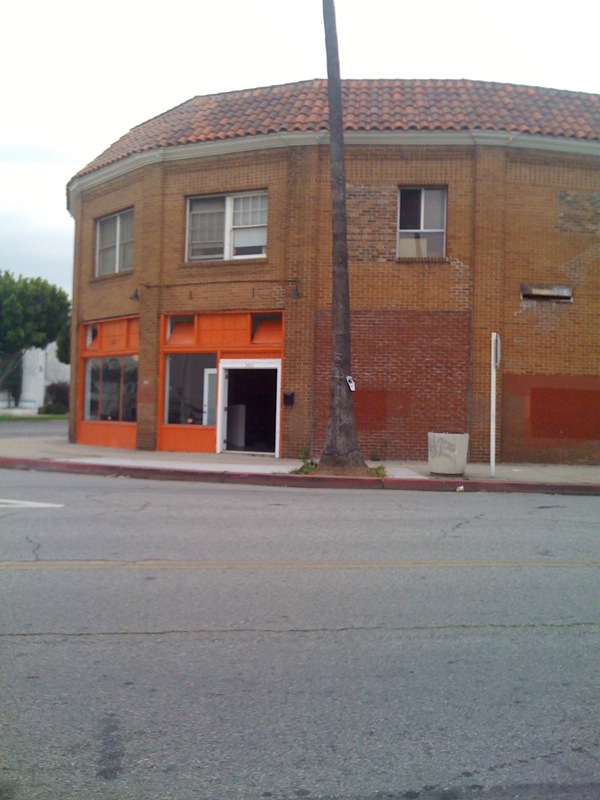Exclusive: Quo Computers, the Cheaper Mac
There's a lot of drama surrounding Apple as of late, most notably in the clone arena.
Suffice to say, the largest recent company to step up to Apple has been Psystar. Last year we interviewed Psystar's CEO, and he mentioned to us that he felt his company was actually helping Apple. In terms of market share, sales, and adoption rate, Psystar considered itself one of Apple's partners. Of course, the big underlying issue was in the way Psystar carried out its strategy.
According to Apple, Mac OS X may not be installed on a computer that is not "Apple labeled." In other words, only Apple may ship computers with Mac OS X installed. This particular lockdown has been a continuing debate among both Mac and PC users. Many users argue that Apple should license Mac OS X to the general public, where anyone with any computer can go and purchase a copy of Mac OS X, install it into their computer and enjoy a highly-tuned version of FreeBSD.
Alas, the cries of an open Mac OS X license have been ignored by Apple.
Consequently, many small businesses have set up shop in order to fulfill this particular void--and to offer something along the lines of a mid-range desktop.
Quo Computer owner Rashantha De Silva tells us he can deliver the solution all while avoiding the legal claws up in Cupertino. How will he do it?
According to De Silva, Quo isn't making Mac clones. Instead, Quo is selling systems that have the capability to install any operating system the customer wishes. Of course, this happens to include Apple's Mac OS X. However, in Apple's Mac OS X EULA, legal fine print indicate that Mac OS X cannot be installed on a non-Apple branded computer. The EULA also says that Mac OS X cannot be modified in any shape or form.
Get Tom's Hardware's best news and in-depth reviews, straight to your inbox.
De Silva claims that Quo sells blank computers, and the operating system of choice is installed by the customer. If the customer wishes to install a copy of Mac OS X, Quo will sell the customer a retail copy and leave the installation up to the user. This method appears to solve the installation issue printed in the EULA, but what about modification?
Up until recently, users who wanted to install Mac OS X on their generic PCs had to modify certain portions of the operating system. One of the hacks include a patched copy of dsmos.kext--a system driver used by Apple to lock down OS X. "DSMOS" stands for Do Not Steal Mac OS. So how does Quo get around this?
Quo computers uses Art Studios Entertainment's EFiX module--the famed USB module that seamlessly allows the booting of both legacy BIOS and newer EFI operating systems. Because Mac OS X is an EFI OS, it's able to boot off a system with an EFIX module installed. We asked De Silva if Quo will be including an EFiX module with all systems, and whether or not the customer requests Mac OS X. De Silva told us a firm yes.
An interesting point to note is that ASEM, upon hearing of Quo, took a defensive stance against the system builder. ASEM noted on its website that it does not condone what Quo is doing with its systems. ASEM refers to its EFIX modules as boot processing units or BPUs. ASEM recently filed a suit against EFIX-USA, a U.S.-based reseller of EFIX modules for launching clones with EFIX modules and Mac OS X Leopard pre-installed. With ASEM's near immediate attack on EFIX-USA, the distributor subsequently removed such systems from its website.
"That's where Quo is different. That's our system's specialty," said De Silva. "We want to sell affordable computers to customers that give them flexibility to choose any operating system they want. We're not here to hurt Apple sales." When we asked De Silva where Quo sourced its EFIX modules, De Silva declined to comment, saying that "it's a secret."
We asked De Silva what differentiates his business from the likes of others in the same market.
"We really hate the word 'hackintosh,' it's not what we do. We don't hack anything. We enable choice for the user. We also believe that, with this strategy, users will be able to use Mac OS X the way they want. Apple doesn't have a mid-range desktop, and we think we can provide that," said De Silva.
So what's inside a Quo computer? As of right now, Quo uses custom built computers based on Gigabyte P45 chipset motherboards. Various Intel CPUs are used, and Quo installs Nvidia graphics cards up to GeForce 285 GTX variants. De Silva mentioned that Quo was also validating motherboards from DFI, and that there will be Core i7 systems coming soon.
What does a Quo computer look like? Take a look below:
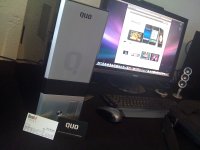
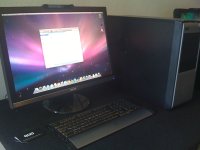
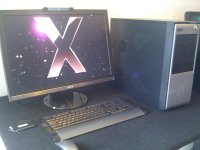
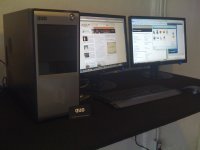
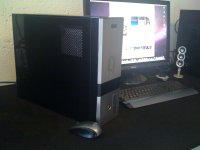
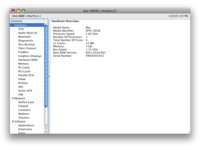
In the Leopard System Profiler screenshot I took, you can see the model of the Gigabyte motherboard that Quo uses in one of its models. This particular system used a Gigabyte GA-EP45-DS3R with a quad-core Intel Core 2 running at 2.83 GHz. The system was also outfitted with 4 GB of RAM. The boot ROM you see there was courtesy of the EFIX module.
We're waiting for our review unit to arrive. Our in-depth Q&A session with De Silva is going up soon. If you want your own questions answered by Quo, send your questions personally to me at tuannguyen at bestofmedia dot com.
-
cadder I thought it had been determined that shink-wrap licenses (EULA) didn't really have that much power. IOW you buy the product, you can do whatever you want to do with it as long as you don't make counterfeit copies or something like that. If the user buys the product and then has the ability to modify some components of the product, then that should be their right.Reply -
anamaniac On the Mac site, a 1TB 7200rpm for the mac desktop costs $300...Reply
The best graphics option is a single 4870 512MB at a hefty price.
The list goes one.
Mac OS X server.
Who the hell ever came up with that idea?
Through all I'm concerned, as long as apple still somehow profits from the sale of the OS, they can screw off.
I want this system, and I want this OS. Dont like it? Then bugger off.
I don't need a pathetic box computer, I don't need a AIO, as they both aren't enough for my desires.
I don't need a server platform either.
What I want is a desktop. There is a difference. Quad core and a decent GPU (or two). What the hell is wrong with that? -
GAZZOO what a load of garbadgeReply
What is it with people who can not take NO for an answer
this will only undermine the integity of Apple and there high grade computers and no I am a PC home build person
Gazz -
tacoslave i never see the use in macs for the price of an entry level mac pro (that snobby college students get because they dont know shit about a computer just style) you can get one of the most powerful laptops ever. The asus w90 it has a mobility 4870x2 and can play whatever for 2,200 dollars. did i mention its a quad core?Reply
http://www.newegg.com/Product/Product.aspx?Item=N82E16834220527 -
Cmhone If Apple wants to remain a boutique bit-player that's more sizzle than steak, then let them. I'm perfectly happy with the bang for the buck I get with Windows-based systems.Reply -
starryman I used both Mac and PC. I also dabble with a Linux box too (Ubuntu). I build a new PC about every 2 years and in the last few years I'm amazed with what I can do with $1,000 for a new PC (less OS and software).Reply
I also get an upgraded Mac every 2 years or so off of Craigslist. While computers lose value pretty quickly, I realized that Macs also lose value quickly too. So I usually get a new Mac laptop or desktop for $600-800 with pretty good specs and less than 2 yrs old. Basically they sell for 25-30% of the price after 2 years.
Bottom line - Macs are great if you buy them used. Buy them new... well that's just tossing money away. -
Platypus "DSMOS" stands for Do Not Steal Mac OS.Reply
Call me crazy, but it looks like they are missing an all-important "N" in that acronym. I would say it now stands for "DO Steal Mac OS." -
chaohsiangchen Letters from Apple Inc.'s law firm will arrive Quo Computers in 3.... 2.... 1.....Reply -
pocketdrummer computabugOr "Don't Steal Mac OS"Reply
Nah, they want it to be stolen. How else will Apple lawyers have jobs?! (no pun intended)
